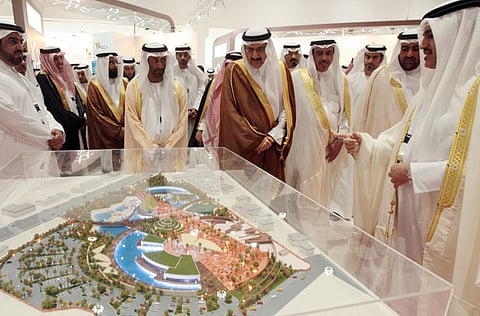Less energy needed to build pavements
Pavement construction and maintenance made more sustainable through municipal strategies

Abu Dhabi: Up to 40 per cent less energy is used for pavement construction and maintenance in the capital, as municipal authorities implement a host of sustainable strategies.
While new pavements are being built with geogrids or crushed concrete waste, material from pavements that need to be refurbished are being recycled and used to reconstruct them, said Ahmad Ali, project design consultant for internal roads and infrastructure at the Municipality of Abu Dhabi City.
“These new building strategies have resulted in significant reductions in carbon emissions and costs, and they are being implemented on a case by case basis,” Ali added.
He was speaking on the sidelines of the eighth GCC Municipal Conference and Exhibition, which kicked off in the capital on Tuesday. The two-day event is expected to see 2,500 visitors, including government officials and municipality representatives from across the GCC.
Ali explained that the municipality has been looking at ways to improve the sustainability and durability of Abu Dhabi road assets, such as pavements, over the last few years, and has implemented several pilot projects in suburban areas like Bani Yas and Shahama.
One of them involves using geogrids, which are made of geosynthetic materials, to reinforce pavement strength and reduce necessary thickness.
“Inserting geogrids, strong mesh-like structures made of geosynthetic materials, means that less raw materials need to be used to make pavements more durable. We have estimated that this strategy would lead to Dh100 million cost savings over a 20-year project lifecycle, and a 15 to 25 per cent reduction in energy consumption,” he said.
On the other hand, constructing new pavements from concrete waste also leads to 20 per cent less energy consumption, and cheaper raw materials. This waste is obtained at a site in Al Dhafra that stores concrete from demolished old buildings. The site receives 5,000 to 8,000 tonnes of recycled crushed concrete every day.
The success of this method led to the Department of Municipal Affairs, which oversees municipal activities in the emirate. specifying the use of a portion of recycled concrete for new pavement building in 2012, the consultant said.
Meanwhile, the enhancement of old raw materials using a few simple additives has enabled their use in rebuilding the pavements they constitute.
“This technique of pavement maintenance allows for 75 per cent faster construction, and 40 per cent less energy consumption,” Ali said.
Lighting
A focus on sustainability has also seen several neighbourhoods and roads in Abu Dhabi fitted with light emitting diode (LED) fixtures, which are known to be more energy-efficient than conventional lights.
“As the streets undergo periodic maintenance, we aim to retrofit all 100,000 lighting poles in Abu Dhabi city with these fixtures. In the near future, we will also install more than 7,000 poles with LED lights in the developing locality of Mohammad Bin Zayed City, and about 3,000 poles in Khalifa City,” said Ahmad Al Sa’adi, head of maintenance for internal roads at the municipality.
Sign up for the Daily Briefing
Get the latest news and updates straight to your inbox


